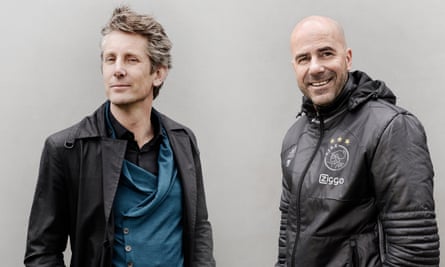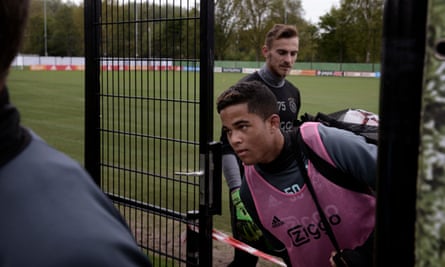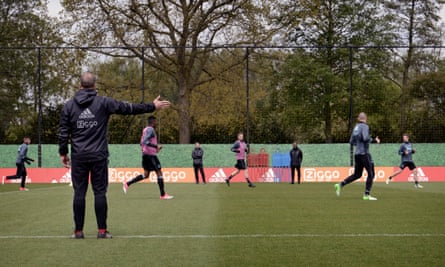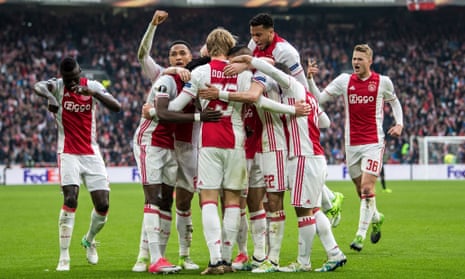It is a cold Thursday morning at Ajax’s De Toekomst complex, where the canteen doubles as a trophy room, the sheer weight of football knowledge can be overwhelming, and the atmosphere is unsurprisingly buoyant after the events of the previous evening at the Amsterdam Arena. Nothing is being taken for granted but Ajax can be excused for feeling pleased with themselves after their stunning performance in the first leg of their Europa League semi-final. These occasions are supposed to be cagey, cautious affairs and they have just torn up the script by beating a dangerous Lyon side 4-1.
Out on one of the pitches, the team are doing a light recovery session. The rondos are over and the time has come for some shooting practice. Edwin van der Sar is watching from the touchline and the coach leading the forwards is Dennis Bergkamp. One of the players to catch the eye is Justin Kluivert, a young winger who keeps finding the top corner with eerie calm.
It is a scene that sums up Ajax’s philosophy, with each character representative of a part of the club’s soul, and the past and present combining to create a brighter future. Bergkamp is the cerebral genius who looks as if he could still do a job on the pitch, Van der Sar the former goalkeeper who has become an unlikely marketing expert and Kluivert the teenage son of the man who scored the winning goal when Ajax won the last of their four European Cups by beating Milan 22 years ago.
The manager is elsewhere. Peter Bosz, who was so fascinated by Ajax in the 90s that he would drive from Rotterdam to Amsterdam to watch Louis van Gaal’s training sessions and whose ideals developed from his heaving scrapbook of Johan Cruyff articles, spends the morning inside his office, pinpointing areas for improvement before Thursday night’s second leg at Stade de Gerland.
He is worried. Alexandre Lacazette, Lyon’s star striker, is fit again after a thigh injury. “I already saw five or six moments where if my defenders stand like they were standing yesterday, against Lacazette he will score,” Bosz says. “I have to show them.”
Not many clubs can match this level of heritage, which explains the romance attached to the thrilling revival that has taken Ajax close to their first European final in 21 years, an achievement made even more impressive by how they are staying true to their identity: seven of the starting lineup against Lyon were 21 or under.
For the time being, of course, they cannot hope to take part in the latter stages of the Champions League. Van der Sar calls it “a playground for the rich and famous” and Ajax know to their cost how much money talks in the modern era, how market forces have conspired against them and benefited the biggest clubs in the richest leagues. “For a club of the stature of Ajax, it’s been too long that we were away from the international podium,” he says.

One of the finest goalkeepers in Europe during his playing days, now Van der Sar is one of the Ajax greats striving to turn Cruyff’s vision of how the game should be played into a reality. Bergkamp, Richard Witschge and Aron Winter are on the coaching staff, and Marc Overmars is the technical director. Jaap Stam worked with the defenders before moving to Reading. “He taught me how to use my arms,” Joël Veltman, a veteran in this team at the age of 25, says. “I was too shy in duels. He said don’t smash in but use your arms.”
They are a fascinating group who regularly collaborate and debate football. There is no shortage of opinions. “That’s the funny thing,” Van der Sar says. “It is not always easy but we speak as one voice. We have a technical heart.”
Intriguingly, however, Van der Sar’s role is not on the pitch. Marketing, rather than coaching, appealed to him after he retired. Now the former Manchester United No1 is responsible for increasing Ajax’s financial competitiveness. They do things differently here.
“When I got a call from Johan Cruyff and Dennis Bergkamp two months after I retired, this was the idea that they had for the club, to bring an ex-player into the directors’ office and eventually as the main man,” he says. “Those six years at United showed me what a club needs. You need commercial revenue and exposure. I have brought that a little bit, getting three Chinese sponsors. It’s trying to connect two worlds. That’s why we want a footballer as a CEO.”
While Van der Sar watches training from a distance for 10 minutes, Bosz eventually emerges from the main building shortly after midday. He is looking like an inspired appointment. His predecessor, Frank de Boer, won the title in each of his first four seasons but Ajax faded in his final two campaigns and made little impact in Europe. Bosz has energised the team since his arrival in the summer and is popular, despite spending five years at Feyenoord as a player.
Ajax’s hated Rotterdam rivals are likely to win the Eredivisie, despite their 3-0 defeat at Excelsior last weekend. They are a point above Ajax with one match left but optimism fills the Amsterdam Arena these days. Bosz’s young team started nervily against Lyon but the noise never died down during an awkward opening 20 minutes. The fans love what they are watching.
Bosz cannot stand negative football. He was a defensive midfielder – “a destroyer” – but that is not his managerial style. “When I see my team only defending and destroying like I did I will not enjoy it,” he says. “I thought when I’m on the bench at least I will give myself a happy afternoon. If I give myself a happy afternoon, I can give it to the fans.”
In an echo of Pep Guardiola’s Barcelona, Bosz favours a feverish pressing game. “Barcelona have a three-second rule,” he says. “We’re not Barcelona, so I put two seconds on.”
Bosz laughs. “The five-second rule is something that if you lose the ball, this is the best moment to get the ball back again. The opponent needs more or less five seconds to get in the right positions. We have to get it back right away.”
The 53-year-old is an admirer of Guardiola. His favourite book is Pep Confidential, Marti Perarnau’s account of Guardiola’s first season at Bayern Munich. He learned from Guardiola’s attention to detail, how he would work out in advance which opposition player was always free on the counterattack. “I always thought Bayern Munich is such a strong team that you don’t have to watch for the opponents for two or three days,” Bosz says.
There are similarities between Bosz and Guardiola. Bosz’s critics believe his high-risk strategy asks for trouble but his principles have not changed since his first job at lowly AGOVV, from where he went on to enjoy success at Heracles and Vitesse Arnhem.
“What they call naive is that my defence was on the halfway line with a lot of space at the back,” Bosz says. “But you have to organise really well. If you do that, you have the five-second rule. You lose the ball and press them immediately, then it’s possible. If you look at our performances in Europe, yesterday was [only] the second time we have conceded in our stadium.”
That level of intensity requires mental sharpness as well as physical fitness. Any player who allows his head to drop after possession is lost finds himself on Bosz’s wrong side. “Don’t be disappointed in yourself,” he says. “Don’t be disappointed in your team-mate. You have to press. This is the moment. Not one player. The whole team. If you do that right, you will not concede. We have young players, so when we lose the ball, in their mind, they go back immediately because they have to defend. My way of thinking is we go forward immediately because we want the ball back.”
Bosz should not be mistaken for a misguided idealist. He is focused on maintaining organisation and spends hours poring over matches to find seemingly innocuous mistakes. He does not smile much and his mother tells him to laugh more on television but he insists he is a positive guy. “But I am also critical,” he says. “There is no such thing as a perfect game. It doesn’t exist. It will never exist.”
What about when Barcelona … “Beat Real Madrid 5-0? There were a lot of things in the game that they didn’t do well. I look on the computer and I write down the right-back, ah, he is too high.”
The five-second rule works only if Ajax are alert to danger when they have the ball. Bosz calls this rest defence. “There may be 50 things we have to do well,” Bosz says. “First I explain to my players how we will play. Then I will show them an animation of rest defence. Then clips of training and the game. Then we show them the mistakes we make and what we have to do better. You also show them when the pressing game was amazing. We show them clips from big teams in Europe. Then the idea is in the heads of the players.”
His approach stems from his appreciation of Cruyff. “I had only one idol,” Bosz says. “I knew from the age of 16 that one day I will become a coach. So I was preparing by writing down what my coaches were doing right but also reading a lot from Johan. With some friends, we more or less wrote our own book. Every article, all his interviews were in there. We collected them and tried to organise them – this is for attacking, this is how you defend, this is tactical.”

At the start of last year Bosz joined Maccabi Tel Aviv, whose technical director is Cruyff’s son, Jordi. “Just before Johan died, he came to Israel,” Bosz says. “We spent a week together. It was just amazing. Instead of the book that you made, he is talking to you. I was just listening. In one week I learned enough for 10 years. He saw two Maccabi games and he was there at every training session.”
Bosz’s head was brimming with ideas but he is aware that not every player is a football obsessive. “This is dangerous for a coach,” he says. “If I want to give all my knowledge to my players, they will get bored. My speech before the game is not more than five minutes. It’s important from those 50 things that I pick the right ones.”
His players took some convincing at first, especially the defenders, and Ajax dropped costly points early on. Veltman says: “It was tough. If the left winger goes to the area, you go with him. I was like: ‘Ninety minutes man, it’s impossible.’ But it is fun. Sometimes I’m on the pitch just enjoying it like a fan on the side. Then I get goosebumps.”
Veltman is a product of Ajax’s academy, along with the captain, Davy Klaassen, and a younger generation is emerging. Kluivert turned 18 last Friday. Matthijs de Ligt, a 17-year-old defender, recently made his Holland debut. Van der Sar says: “It has intensified in the last five or six years. We have changed the academy and put an even bigger emphasis on training and development hours and facilities and coaches. We train more in the first year. Then the teachers come here and then they train again – instead of first going to school and then training. So we have two or three more training moments than before. Hopefully that will pay off.”
Van der Sar knows that avoiding a talent drain will not be easy. Klaassen is being linked with a summer move. Ajax cannot compete financially with the leading clubs in England, Germany, Italy and Spain. Can they hold on to Kasper Dolberg, their lethal Danish striker, or Hakim Ziyech, their brilliant Moroccan attacking midfielder? Can Overmars keep finding cheap gems such as the outstanding Colombian centre-back Davinson Sánchez?
Van der Sar says: “We don’t have the spending power of other clubs. We want to bring our own players through – of course there is money to spend but ideally we want to develop players. If they’re good enough for the top European level, you see the average ages of the players who join the big clubs.
“You touch everything in this club. As a player I always had a look at the people doing the laundry or the guy cleaning the boots or the security guards. It’s important to feel that everyone is pulling in the same way. That’s reflective in how the club works. You need a good right-back, a good centre-half, a No10 – I need a good operational director, a financial guy. It’s making sure everyone goes forward. There’s the goal – we need to score. Everything behind me was bad because that’s a goal. We need to push.”

Ajax’s scouting must be clever. Selling Arkadiusz Milik to Napoli for £27m last year enabled Overmars to break the £10m barrier for the first time when David Neres, a 19-year-old Brazilian forward, joined from São Paulo in January.
Bosz’s tough three-year spell as Feyernoord’s technical director not only allowed him to broaden his mind by travelling the world but also offered him an insight into Overmars’s job.
All Bosz asks from Overmars is that he brings him clever players. “I don’t care what they did at school,” he says. “I met some guys who went to university and were not intelligent players. Intelligent players anticipate. Unintelligent players react. Always. If you think faster, you are faster on the field. If you react, you are always too late. Know what’s going to happen, not what’s already happened.”
This is the Ajax way. It goes back to Cruyff. “We have to be different,” Bosz says. “It’s the only way we have a chance.”

Comments (…)
Sign in or create your Guardian account to join the discussion